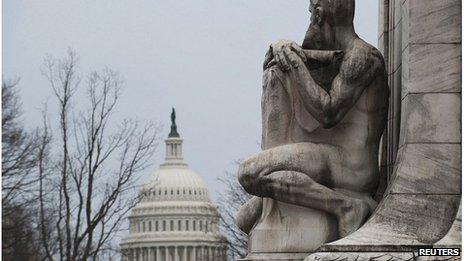Fiscal cliff: US Congress edges towards tax rate deal
- Published

US politicians seeking a deal to avoid steep tax rises and spending cuts known as the "fiscal cliff" are edging towards agreement, reports say.
Democrats are said to have offered to extend tax cuts on couples earning up to $450,000 (£277,000). But divisions remain over spending cuts.
At a news conference, President Barack Obama said a deal was "within sight" but not yet done.
Failure to reach agreement by 1 January could push the US back into recession.
Any deal needs to pass the 100-member Senate, which is controlled by Democrats, before heading to the House of Representatives, where Republicans hold the majority.
Mitch McConnell, leader of the the Senate's Republican minority, and Vice-President Joe Biden held "good" talks late into Sunday evening, a spokesman for Mr McConnell said.
Agreeing to a $450,000 threshold ($400,000 for couples) would be a notable compromise by Democrats, analysts say.
The party previously only wanted tax rate extensions for earnings under $200,000 (£123,000) for individuals and $250,000 (£154,000) for couples.
But after weeks of increasingly desperate horse trading and public pronouncements, the "contours" of a deal were said to be emerging just hours before the midnight deadline.
Inheritance tax rates and the continuation of unemployment benefits were also part of the deal-making, reports said, but disagreements remained over how to deal with the automatic spending cuts due to kick in on 1 January.
Fallback plan
The two parties have been fighting for months over how to deal with the combination of automatic spending cuts and the expiration of Bush-era tax reductions at the new year.
Without an agreement, higher taxes will rise for virtually every working American and across-the-board cuts in government spending will kick in from Tuesday.
Analysts say this could significantly reduce consumer spending, leading the US economy to fall off the "fiscal cliff".
If no agreement is reached on Monday, senators are expected to be given the chance to vote on a fallback plan proposed by President Obama.
That would renew tax cuts on earnings under $250,000 (£154,000) and extend unemployment benefits, but does not address the spending cuts.
The Senate convened on Monday morning, its first session on New Year's Eve in four decades, and the House followed shortly afterwards.
The Republican Speaker of the House, John Boehner, has insisted that the Senate act first.
The current stand-off has its roots in a failed 2011 attempt to tackle the government debt limit and budget deficit.
Republicans and Democrats agreed then to postpone difficult decisions on spending until the end of 2012.
Commentators say that even if a deal is reached, it will do little to reduce the original problem of the deficit and the government debt limit, raising the prospect of further political infighting early in the new year.
Parties divided
Mr McConnell and Mr Reid were locked in negotiations over the weekend.
Late on Sunday, Senate Republicans said they were dropping their proposal to slow the growth of Social Security payments. The plan - which would have led to lower benefits to pensioners and the disabled - had been fiercely resisted by Democrats.
There is also debate over where to set the threshold for tax rises. Democrats say the Bush-era tax cuts should be extended for all Americans except the richest.
Republicans - some of whom have pledged never to vote for increased taxes - say the deficit is a consequence of excessive government spending.